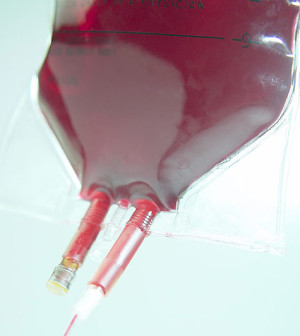- Could Your Grocery Store Meat Be Causing Recurring UTIs?
- Are You Making This Expensive Thermostat Error This Winter?
- Recognizing the Signs of Hypothyroidism
- 10 Strategies to Overcome Insomnia
- Could Artificial Sweeteners Be Aging the Brain Faster?
- Techniques for Soothing Your Nervous System
- Does the Water in Your House Smell Funny? Here’s Why
- Can a Daily Dose of Apple Cider Vinegar Actually Aid Weight Loss?
- 6 Health Beverages That Can Actually Spike Your Blood Sugar
- Treatment Options for Social Anxiety Disorder
Anemia Boosts Stroke Death Risk, Study Finds

Older stroke victims suffering from anemia — a lack of red blood cells — may have higher odds of dying, researchers report.
Among thousands of stroke patients, those who were anemic had a 1.5 to two times higher risk of dying within a year compared with patients without anemia, said Dr. Phyo Myint, lead researcher on the new study.
“There is no clear evidence to suggest treating anemia will prevent stroke, but like in many other conditions, people with anemia should find out why they are anemic and treat the cause if possible,” said Myint. He is a professor of medicine of old age at the University of Aberdeen in Scotland.
However, why anemia increases the risk of death after stroke isn’t clear, Myint said.
Anemia is common in stroke patients, he added. Older people in general often have anemia or low levels of hemoglobin, the proteins in red blood cells that carry oxygen throughout the body.
For the study, Myint and colleagues examined data from more than 8,000 stroke patients, average age 77, hospitalized between 2003 and 2015 in the United Kingdom. In addition, the researchers reviewed 20 previous studies, which increased the total number of patients to nearly 30,000.
Myint’s team found that about 25 percent of the stroke patients were anemic. The condition was associated with a higher risk of death at multiple time points for up to one year following either ischemic stroke (blood clot in the brain) or hemorrhagic stroke (bleeding in the brain).
However, elevated hemoglobin levels were also linked with poorer outcomes and a higher risk of death, mostly within the first month after stroke. This suggests both low and high levels of hemoglobin might be tied with a higher risk of death after stroke, the researchers said.
“Clinicians should be aware of this new knowledge and appropriately manage stroke patients with anemia,” Myint said. “This could potentially reduce the risk of dying after stroke in people with anemia.”
However, just increasing hemoglobin levels won’t necessarily improve outcomes in these stroke patients, he said.
“Treatment will be different from one individual to another, and the management strategy will need to be decided by the clinician,” Myint suggested.
Another expert agreed that it’s not clear how these patients should be treated.
Increasing levels of hemoglobin to get more oxygen to the brain would seem to be a preferred treatment, said Dr. Gregg Fonarow. He is a professor of cardiology at the University of California, Los Angeles. But research hasn’t shown that to be the case.
“Some clinical trials which tested interventions for treating anemia in patients with cardiovascular disease have actually shown higher risk of cardiovascular events with attempts to raise hemoglobin and treat anemia,” Fonarow said.
It’s also not known if “anemia is merely a marker of other factors contributing to higher risk,” he added.
According to Fonarow, more research is needed to determine if treating anemia might improve stroke survival. “Randomized trials would be needed to establish benefit and safety before any specific treatment should be considered,” he said.
The report was published online Aug. 17 in the Journal of the American Heart Association.
More information
For more on stroke, visit the American Stroke Association.
Source: HealthDay
Copyright © 2026 HealthDay. All rights reserved.










